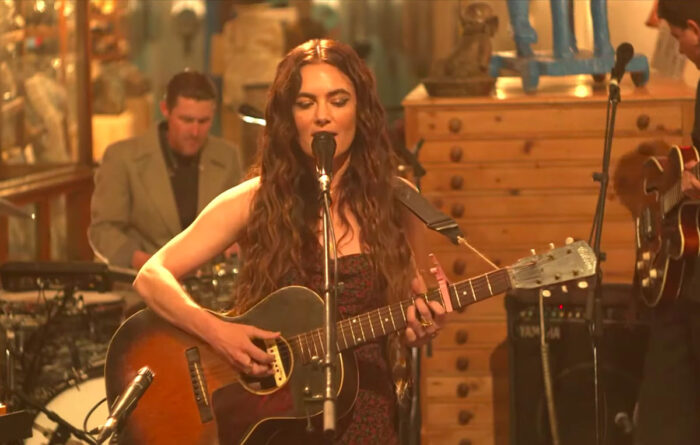Album Review: Julia Stone – Sixty Summers (BMG)
This is an album that begins and ends with a dance. This may be surprising as Julia Stone is most well known as half of the folk pop duo with her brother Angus Stone and her outstanding ability to play the trumpet one handed whilst holding a guitar. The folk lyrics of love, the trumpet, and the guitar, are still there but this is an album with music to engage the body and the heart as well as the ears and the head.
Her key collaborators musically are Doveman and St Vincent and as well as their fingerprints on the sonic landscape the album reminds me of Lorde, Weyes Blood and Goldfrapp.
The opening track Break captures the feeling of vulnerability and excitement that are hand in hand at the start of a relationship “Darling, darling, I feel like I might break. Darling, darling you take my breath away.” Urgent beats drive this song along and add to the feeling of tension and excitement.
Different emotions are captured lyrically and musically over the course of the next thirteen songs as various stages of love and relationships are charted. Sixty Summers slows things down and lists a number of things that “I never want to hear you say.” The trumpets dominate this song and build to a cacophony of noise by the end. On Substance the singer is unsettled and feels that what she gets is “never enough”.
The gentle piano led We All Have has spoken words of quiet reflection that are echoed and then shared by the gravel voice of Matt Berninger. This song sounds like a post argument evocation to take care of yourself and your partner. On an album where the drum beats drive most songs this is a stand out moment of calm enabling its simple message “Love is all we need to be here for” to come through clearly.
There is an upbeat section of the album that starts with the first of two versions of Dance. This song has an elegant vibe in which her love for her partner is reaffirmed “I was counting on you, when you were counting on me.” This is followed by Free which has a fanfare of trumpets over a driving beat and a singer who “Can’t stop thinking of you.” Who has the hooky, whispered “Oh, Oh, Oh, loving you like I do” refrain, however there are ambiguous feelings expressed, “You say you want to leave me but you don’t walk away,” that undercuts the joy of the music with doubts about where the relationship will go next.
The final song of this section is the glam rock stomp of Fire in Me. This has a familiar sounding bass line and “come on” response (for example, Uprising by Muse) that drive a plea to awaken the emotions within and to feel things more fully.
There are slower songs that wrestle with concerns about what to think and how to feel as the relationship develops. Drums, Bass and Synthesisers rise up and drop out to create a woozy feeling where thoughts aren’t clear on Queen and Heron. The immediately accessible, Easy, places the wistful thought of ‘I wish that I was easier for you” over subdued strings to create a late night, slightly drunk, feel,
The intriguing “Unreal” lyrically subverts the lyrics of Sylvester’s 70’s disco hit You Make Me Feel (Mighty Real) to become “You make me feel, so unreal”. Instead of a pounding disco beat the skittish drums and droning synthesiser emphasises that the singer feels unsettled in the relationship.
I am No One is a meditation on the end of a relationship. Starting off with a delicately strummed guitar and soft hand drum beats the lyrics consider “what have I become’ and reflect on various times together. The “Oh, Oh, Oh” refrain from Who is repeated but is now mournful rather than excited. As the layers of synthesisers increase the lyrics philosophise that the wider lessons learnt from this relationship will “teach me something bigger than this”.
The end of the album isn’t downbeat as the final song is the second version of Dance. This time the verses are spoken in French with some variations to the lyrics of the earlier English version. This bookends the album well as dancing takes us back to the very first words of the album about dancing in the street.
The visual choices complement the songs and help draw us in further. The videos are mini features. For example, Dance by Jessie Hill has uplifting performances by Susan Sarandon and Danny Glover as a couple preparing to meet each other, and then showing that love and dancing are not just for the young, and Unreal by Bonnie Muir mines the theme of loss and replacement of a loved one in a way that echoes a Black Mirror episode.
The album cover by the Croatian – Spanish surrealist Filip Custic is a set of dreamlike images that tempts me to buy the vinyl album to explore them fully in a 12” size version.
While the lyrics would be well served by Julia continuing to use just her voice, guitar and trumpet her choices of musical and visual collaborators have enhanced the emotional depth of the songs and created a new way forward for her.
Click here to listen to or read the 13th Floor interview with Julia Stone.
John Bradbury
